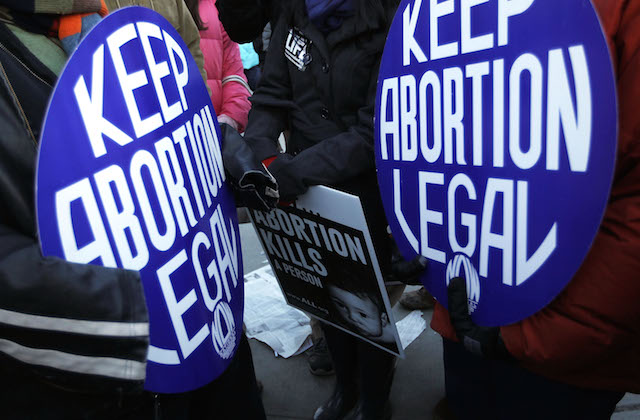Georgia Is Latest State to Ban Abortion After Six Weeks

On Friday (March 29), Georgia joined a number of other Republican-controlled states to pass what reproductive rights advocates call a “heartbeat ban,” which will prohibit abortion after six weeks of pregnancy.
To become a law, the "Living Infants Fairness and Equality (LIFE) Act" (H.B. 481) must now be signed by Governor Brian Kemp. After it was passed in the legislature, Kemp—a Republican who ran on an anti-abortion platform during his 2018 campaign—tweeted that the bill "reaffirms our priorities and who we are as a state."
Women in Georgia can currently have an abortion up to 20 weeks of pregnancy. But under the new law, that would change to six weeks. According to NPR:
The bill makes exceptions for abortions in cases that involve rape or incest, on the condition that a woman files a police report first. It also excludes situations in which a physician has determined that a pregnancy is "medically futile" or that a "medical emergency exists" that could "prevent the death...or the substantial and irreversible physical impairment of a major bodily function of the pregnant woman."
Similar bills, which have passed in Kentucky and Mississippi in recent weeks, are called “heartbeat bans” because they make abortion illegal once a fetal heartbeat can be detected on an ultrasound—which is possible when a person is six weeks pregnant. Reproductive rights activists say it is essentially a way to strip pregnant people of the option of having an abortion. This is because six weeks of pregnancy occurs just two weeks after a missed menstrual period, when many people do not know they are pregnant.
Georgia, which has a population that is 40 percent people of color, already faces numerous challenges regarding women’s health care. It has a shortage of obstetricians and one of the highest maternal death rates in the country, reports The New York Times.
Reproductive rights activists and politicians, including Georgia politician Stacey Abrams, say that this bill will further endanger women’s lives.
There is no leadership in damning women to the whims of yet another test of our humanity. #HB481 is bad for women bc reproductive injustice is real. It is bad for business bc women won’t forget. And it is a stain on a state that once knew how to light & lead the way. #Shame /end
— Stacey Abrams (@staceyabrams) March 29, 2019
Just now, politicians in Georgia voted to ban abortion after 6 weeks — the third state to pass this harmful restriction this month.
— Leana Wen, M.D. (@DrLeanaWen) March 29, 2019
Time is of the essence. Anti-reproductive health politicians are preparing for a post-Roe future. #StopTheBans https://t.co/jr1OCAMp6D
Hollywood is also speaking out against the bill. On Thursday (March 28), the day before the legislature voted, 50 actors signed an open letter saying that they will work to move their projects out of Georgia because of the law. Written by Alyssa Milano, signees included Uzo Aduba, Don Cheadle, Gabrielle Union and Laverne Cox. “We want to continue to support the wonderful people, businesses and communities we have come to love in the Peach State. But we will not do so silently, and we will do everything in our power to move our industry to a safer state for women if H.B. 481 becomes law,” it reads in part.
A group of nearly 90 Georgia-based businesses sent a letter to the state's General Assembly saying the bill would “take the state in the wrong direction,” reports The Washington Post. These companies include Amazon and Coca Cola.
The American Civil Liberties Union (ACLU) also spoke out against the bill, saying it will challenge it in court. “For 50 years the Supreme Court has said that banning abortions before the point of viability is unconstitutional,” Sean J. Young, the legal director of the ACLU of Georgia, said in a statement. “Every judge that has heard a challenge to such abortion bans has struck them down.”
The 2018 confirmation of Justice Brett M. Kavanaugh to the Supreme Court—and the potential shifting of the court’s direction—has provoked new urgency among critics of abortion. This has led to a marked increase in heartbeat bans and other restrictive measures in Republican-controlled state legislatures, as they seek to land a new case before the court in hopes of setting sharper limits or even an outright ban. Twenty-two states are poised to ban abortion if Roe is overruled, reports The New York Times.
If the bill is signed by Kemp, the law will go into effect on January 1, 2020.
